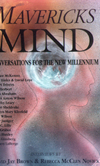 MAVERICKS OF THE MIND: NEW MILLENIUM
CONVERSATIONS
MAVERICKS OF THE MIND: NEW MILLENIUM
CONVERSATIONS
(FULL TEXT OF MAVERICKS
available on the Internet)
Dave Brown & Rebecca Novick interview 16 edge-science thinkers about
what really turns them on and where they are going next. This collections
includes Terence McKenna, Riane Eisler, Tim Leary, Carolyn Kleefeld, Laura
Huxley, Robert Anton Wilson, Ralph Abraham and others. It's the first time
Nick's been found between the same covers as Allen Ginsberg. Dave and Rebecca
have recently published a second set of interviews "Voices
from the Edge" with Ram Dass, Jerry Garcia, Jaron Lanier and sacred-sex
priestess Annie Sprinkle.
DJB: Do you see Bell's Theorem, and our understanding from astrophysics
that all particles in the universe were together at the moment of the Big
Bang, as being a possible explanation for mysterious phenomena such as telepathy
and synchronicity?
NICK: Yeah, I do. But I think that it would be too easy to say that because
we're all connected we have telepathy. Because, again, why do we feel so
alone?
DJB: Doesn't it have something to do with the recency of the connection?
NICK: Yeah. If you make a connection, separate, and then make any other
connections, those later connections will dilute the first connection. So
it's a liitle bit like what's been called the coefficient of consanguinity,
which measures how close people are linked genetically. Your mother is the
closest to you, then your grandmother, and so forth on down.You're all linked
by connections but the most recent connections are the strongest. But, even
then, even when you've just met somebody, and separated, the telepathy between
you is not really readily apparent. It would be something, wouldn't it,
if we lived in a society where the last person you met you had a telepathic
contact with, until you met someone else. That doesn't seem to happen though,
at least on the level we're aware of. So the real question is why is telepathy
so dilute? I would expect a proper science to explain that fact.Then, of
course, once we had that explanation, we could increase it, make it greater,
or increase the diluteness if you didn't want to have telepathic contact
with certain people. So that to me is the biggest mystery. Bell's Theorem
could explain telepathy, but what explains the lack of telepathy? That's
something I don't think anyone has really addressed. There are a few people
who have addressed this fact on the level of psychology, but not physics,
as to why we don't have telepathy. The most convincing answer that I know
about is that it would be just too terrible to look into the hearts of people,
because there's so much pain around that it would be excruciating to tap
into that.
DJB: Do you see the physical universe as being alive, evolving,
and conscious, and, if so, does this perspective, in your opinion, have
any influence on how physicists approach the natural world?
NICK: It does fit right in. Up to now physics has, I think as a kind of
exercise, asked how much can we explain about the world without ever bringing
consciousness into it? Surprisingly, the answer is a lot! Suppose there
were chemical reactions that needed to be prayed over before they worked,
then physicists would have to say we can't explain these reactions, because
that involves the mind. Anything that involves intention, where intention
is important for the outcome, is outside of physics, by definition. So,
we have to call that something else. Either that, or expand the notion of
what physics is--once the mind begins becoming involved with the world.
What I'd like to see are hybrid types of experiments. Experiments where
the mind is necessary, and where matter is also necessary, kind of a mixing
of physics and psychology. But I don't know of any such experiments, except
maybe psychokinesis experiments, and those are very unreliable. It's hard
to get good data.
RMN: The mind is a very unreliable thing. That's probably why physicists
have nothing to do with the mind.
NICK: Yeah, unreliable, that's one way of looking at it.
RMN: You have described quantum theory as a theory of possibilities,
and have emphasized that it constrains not just Appearances, but Reality
itself. With this in mind, in which ways do you feel that the understanding
of the quantum world can affect the barriers and structures in human experience,
which act to limit the enjoyment of these possibilities?
NICK: Oh! The Pleasure Dome Project. Yeah, I would sum up my feelings in
that area this way. It's to take the metaphor of inner space seriously--that
there is an inner space, and that for some reason, some accident of biology
and evolution, each of us is restricted to this tiny little cave in inner
space. But there's this vast area that we could explore, including telepathic
union with other caves, and even going into other non-human areas of mind.
To me quantum physics suggests this--that there is this potentia out there
which we could basically surf. We do play with a little bit of it each day,
but we could probably expand the area of possibility further. It's like
we're living in a tiny little bay, and we could go out into the ocean. That's
the possibility, I think, that quantum physics suggests to me. That someday
we'll be able to go outside our own little bays, and go out into the great
ocean of mind.
Order MAVERICKS
from amazon.com--Earth's biggest bookstore.
BACK
usps://usa.ca/95006.bouldercreek/box261/nick.herbert
quanta@cruzio.com
 MAVERICKS OF THE MIND: NEW MILLENIUM
CONVERSATIONS
MAVERICKS OF THE MIND: NEW MILLENIUM
CONVERSATIONS